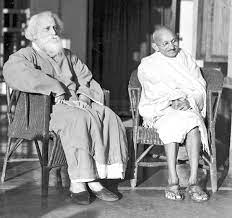Q. What was the difference between Mahatma Gandhi and Rabindranath Tagore in their approach towards education and nationalism?
Ans: Mahatma Gandhi and Rabindranath Tagore, two prominent figures in Indian history, had distinct approaches towards education and nationalism.

Mahatma Gandhi:
- Philosophy of Education: Gandhi emphasized the importance of basic education that was rooted in practical skills, manual labor, and a connection with rural life. He advocated for education that could empower individuals to be self-reliant and contribute to the welfare of society.
- Medium of Instruction: Gandhi favored the use of vernacular languages as the medium of instruction in schools. He believed that education should be accessible to the masses, and using local languages would facilitate this accessibility.
- Nationalism: Gandhi’s approach to nationalism was deeply rooted in non-violence (Ahimsa) and civil disobedience. He believed in Swaraj, self-rule, achieved through non-cooperation with British rule. Gandhi’s nationalism was inclusive and aimed at socio-economic and political empowerment of the masses.
Rabindranath Tagore:
- Philosophy of Education: Tagore was a proponent of a holistic and liberal education system that emphasized creativity, critical thinking, and the development of an individual’s personality. He founded Visva-Bharati University, where education was seen as a means of cultivating a well-rounded individual.
- Medium of Instruction: Tagore supported the use of the mother tongue as the medium of instruction but also emphasized the importance of a global perspective. He believed that education should encourage universal human values and cultural exchange.
- Nationalism: Tagore’s approach to nationalism was more cosmopolitan. He criticized narrow nationalism and the imposition of cultural uniformity. Tagore envisioned a world where different cultures coexist harmoniously, and he was critical of excessive patriotism that could lead to conflict.
Tabular comparison of Mahatma Gandhi and Rabindranath Tagore in their approach towards education and nationalism:
| Aspect | Mahatma Gandhi | Rabindranath Tagore |
|---|---|---|
| Education | – Practical and vocational emphasis | – Holistic and liberal education |
| – Moral and character development through labor | – Emphasis on creativity and critical thinking | |
| – Vernacular languages for accessibility | – Mother tongue with a global perspective | |
| – Focus on self-sufficiency and self-reliance | – Cultivation of a well-rounded individual | |
| Nationalism | – Non-violent resistance and civil disobedience | – Criticized narrow nationalism |
| – Constructive program for socio-economic uplift | – Skeptical of excessive patriotism | |
| – Inclusivity in the national movement | – Emphasis on a cosmopolitan perspective |
In summary, while both Gandhi and Tagore were committed to the cause of Indian nationalism, they differed in their educational philosophies. Gandhi focused on practical, vernacular education with an emphasis on self-reliance, while Tagore advocated for a more liberal, cosmopolitan education that fostered creativity and a global outlook. Their approaches to nationalism also differed, with Gandhi’s being rooted in non-violence and mass mobilization, and Tagore’s emphasizing cultural diversity and a more universal perspective.